Ripple is a blockchain-based digital payment network and protocol. It serves as a payment settlement, asset exchange, and remittance system, akin to SWIFT for international money transfers.
XRP, Ripple's native digital token, acts as an intermediary currency for facilitating exchanges between different currencies or networks. Co-founded by Chris Larsen and Jed McCaleb in 2012, Ripple operates on a decentralized platform, allowing transfers of money in various forms, including traditional fiat currencies and cryptocurrencies.
To learn more, you can head over to our full Ripple review.
A reliable wallet — whether hardware, desktop or mobile — ensures secure storage of your XRP tokens.
This article will explore the top Ripple XRP wallets, highlighting their features, security measures, and user-friendliness.
Why You Need a Ripple XRP Wallet
Investors who own XRP tokens require a dedicated wallet for several key reasons:
- Security: XRP wallets safeguard tokens from scams and hacking attempts, ensuring the safety of investors' assets. Access to the wallet is typically secured by private keys, unless opting for a custodial wallet where a third party manages the keys.
- Transfers: Wallets facilitate the sending and receiving of XRP tokens, as all transactions occur wallet-to-wallet via the Ripple network. Users can transfer XRP by providing the recipient's wallet address, while receiving funds necessitates sharing one's own wallet address.
- Trading: XRP wallets often provide access to broader cryptocurrency markets, enabling users to buy, sell, and trade XRP for other digital assets. Some wallets even offer features like earning interest on XRP deposits through flexible savings accounts.
How to Choose the Right Ripple Wallet
Not all wallets are created equal, and understanding the key features to look for can help ensure the security and convenience of your digital assets.
Here's a more detailed exploration of the important considerations when choosing an XRP wallet:
- Control over Private Keys: You must opt for wallets that provide users with full control over their private keys. This level of autonomy empowers individuals to manage their funds independently, allowing for greater security against unauthorized access and control over their assets. However, it's essential to recognize that with this control comes the responsibility of securely storing and managing private keys to prevent any potential loss or compromise.
- User-Friendly Interface: A well-designed user interface can significantly enhance your experience with a wallet. Look for wallets that offer intuitive navigation, clear instructions, and visually appealing layouts. A user-friendly interface makes it easier to access and manage your XRP assets, reducing the likelihood of errors and increasing overall convenience.
- Active Development Community: The presence of an active and engaged development community is a positive indicator of ongoing support, frequent updates, and timely resolutions to any security vulnerabilities. When choosing an XRP wallet, prioritize those supported by a dedicated team of developers committed to refining and improving the platform over time. An active community can also provide valuable resources, support, and guidance for users navigating the ecosystem.
- Backup and Recovery Options: It's essential to ensure that your chosen XRP wallet offers robust backup and recovery features. This typically involves the creation of a secure seed phrase or mnemonic phrase that can be used to restore access to your funds in the event of device loss, damage, or failure. Explore wallets that provide straightforward mechanisms for setting up and accessing these backup options, as well as clear instructions on how to initiate the recovery process if needed.
- Reputation: A wallet's reputation is a critical factor to consider when evaluating its reliability and performance. Conduct thorough research, read reviews from other users, and seek out feedback from the community to gauge the wallet's reputation over time. A positive reputation indicates trustworthiness, reliability, and a track record of providing secure and seamless services to users. Conversely, wallets with a history of security breaches, glitches, or poor customer support should be approached with caution.
Secure Your XRP: Top Wallets to Consider
Choosing the right Ripple (XRP) wallet is important for accessing features and ensuring security. It's important to select a wallet that suits your security needs and how you plan to use it.
This list of recommended Ripple wallets isn't ranked but offers a range of options with brief descriptions of their features to help you make an informed choice.
| Name of Wallet | Best For | Top Features | Type of Wallet | Price |
|---|---|---|---|---|
| Ledger | Maximum security with XRP and other assets | Hardware security, Ledger Live app, crypto purchases, swaps, staking, NFT support | Hardware / Cold Wallet | Stax: $399 Flex: $249 Nano S Plus: $79 Nano X: $149 |
| Trust Wallet | Mobile users wanting flexibility and control | Security scanner, encrypted cloud backup, fiat-to-crypto and crypto-to-fiat conversions, swapping | Hot Wallet (Mobile) | Free |
| Atomic Wallet | Multi-platform users valuing privacy | Atomic swaps, hierarchical deterministic setup, local key storage, biometric locks, multi-OS support | Hot Wallet (Desktop/Mobile) | Free |
| Exodus Wallet | Beginner-friendly wallet with staking/swaps | Easy UI, staking, crypto swaps, Trezor integration, cross-platform access (desktop, mobile, browser) | Hot Wallet / Hybrid with Hardware Support | Free (Trezor integration optional) |
| Trezor | Cold storage with enhanced security chip | Secure Element chip, CoinJoin, Tor support, multi-asset support, high EAL6+ security rating | Hardware / Cold Wallet | Safe 5: $169 Safe 3: $79 Model One: $49 |
Ledger
Ledger is one of the most trusted names in hardware wallets, offering top-tier security for digital assets like Ripple (XRP). Known for its robust physical devices and companion app, Ledger combines cold storage protection with user-friendly asset management via Ledger Live.
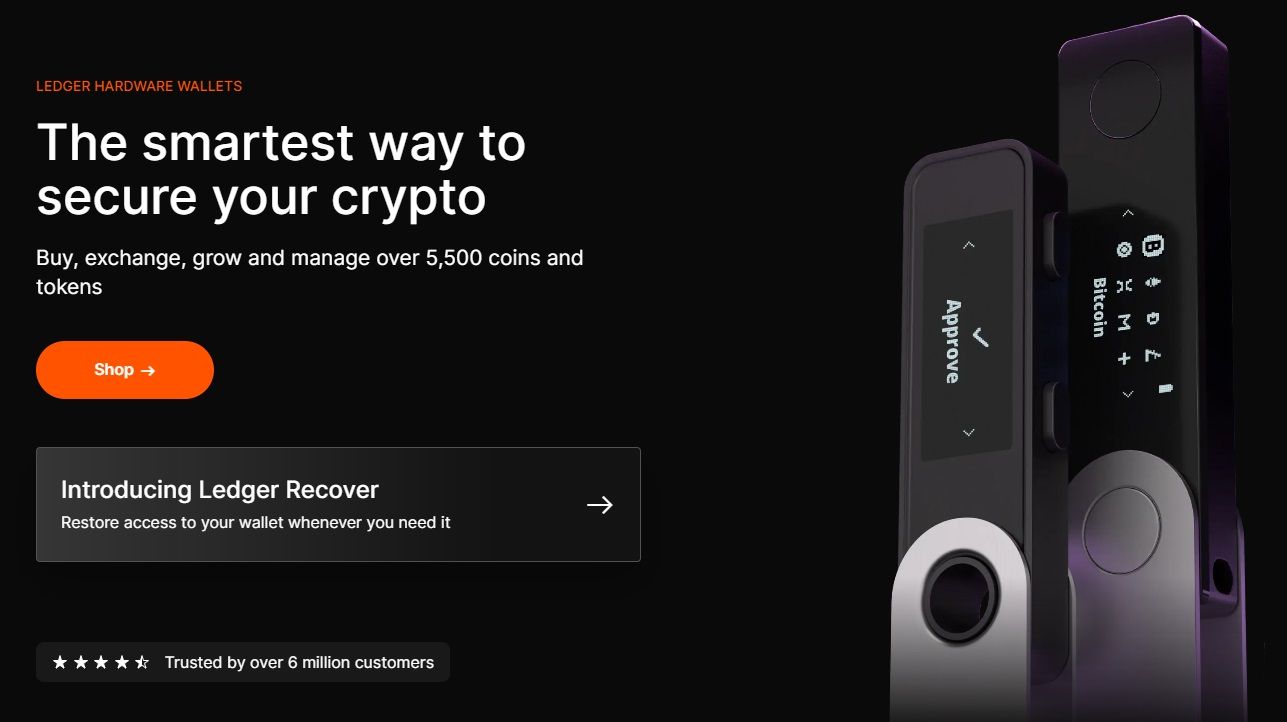 Ledger Is A Popular Hardware Wallet. Image via Ledger
Ledger Is A Popular Hardware Wallet. Image via LedgerType of Wallet
Hardware wallet (cold wallet)
Top Features
- Supports Ripple (XRP) and 5,000+ other crypto assets
- Integrates with Ledger Live for asset management, swaps, and staking
- Compatible with PayPal and MoonPay for crypto purchases
- Offers secure transaction validation via hardware
Best For
Users who want top-tier security and multi-asset management, including Ripple (XRP), with hardware-based protection.
Price
- Ledger Nano S Plus — $79
- Ledger Nano X — $149
- Ledger Flex — $249
- Ledger Stax — $399
Additionally, the Ledger Live app allows for crypto swapping without involving fiat currencies and supports staking, enabling users to earn rewards by actively participating in network validation.
Trust Wallet
Trust Wallet is a popular mobile wallet that balances convenience and security, making it ideal for managing XRP on the go. As a non-custodial wallet, Trust Wallet gives you complete control of your private keys, while offering a sleek interface, built-in swapping features, and fiat integration for seamless transactions.
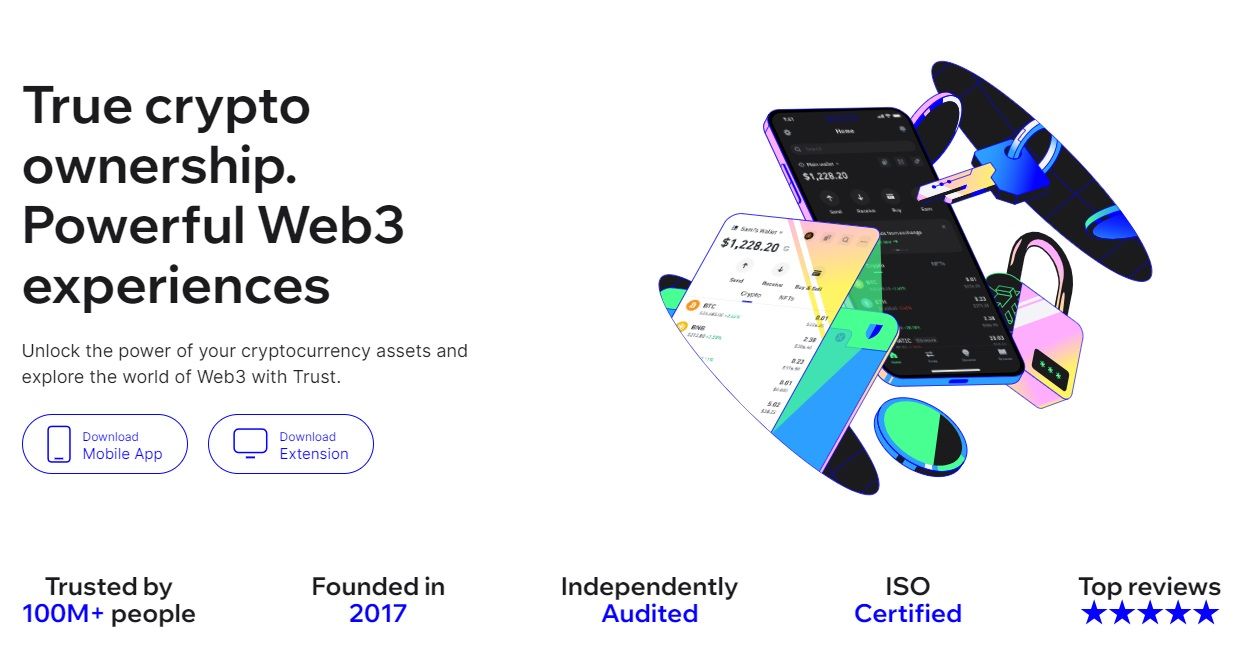 Trust Wallet Offers Features Like a Security Scanner and Encrypted Cloud Backup To Keep Your XRP Safe. Image via Trust Wallet
Trust Wallet Offers Features Like a Security Scanner and Encrypted Cloud Backup To Keep Your XRP Safe. Image via Trust WalletType of Wallet
Hot wallet (mobile, non-custodial)
Top Features
- Security Scanner and Encrypted Cloud Backup
- Supports fiat-to-crypto and crypto-to-fiat conversions (USD, EUR, GBP)
- Fully non-custodial, with private keys controlled by users
- Built-in crypto swapping
- Clean UI and mobile-first experience
Best For
Mobile users who want convenient, multi-functional, and non-custodial Ripple (XRP) storage.
If you're interested to learn more, you can check out our full Trust Wallet review.
Atomic Wallet
Atomic Wallet is a versatile, non-custodial wallet designed for privacy-conscious users who want full control of their digital asset, including XRP. Supporting multiple platforms and offering decentralized trading through atomic swaps, Atomic Wallet empowers users to manage their crypto securely without relying on centralized services.
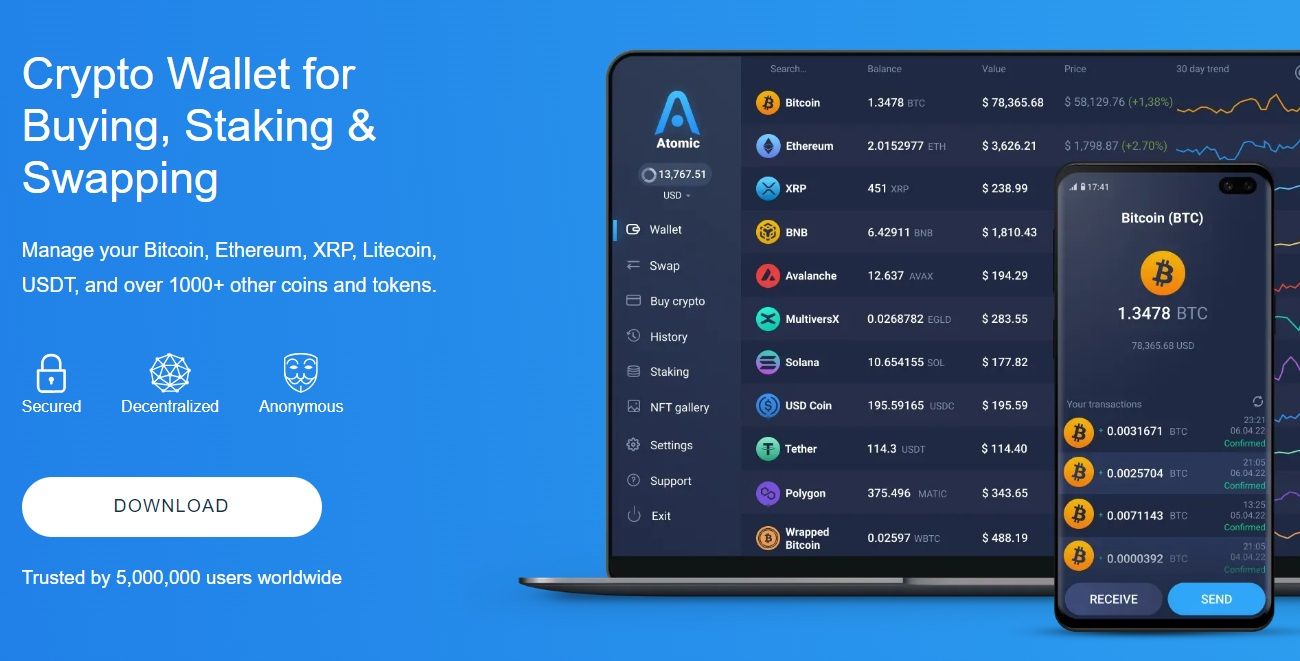 Atomic Wallet Is Available Across a Range of Platforms. Image via Atomic Wallet
Atomic Wallet Is Available Across a Range of Platforms. Image via Atomic WalletType of Wallet
Hot wallet (desktop and mobile, non-custodial)
Top Features
- Supports Ripple (XRP) across all major platforms (Windows, Mac, Linux, iOS, Android)
- Atomic swaps for decentralized, peer-to-peer trading
- Hierarchical deterministic wallet for enhanced privacy
- Local storage of private keys
- 12-word recovery phrase & optional biometric locks
Best For
Users looking for a desktop or mobile wallet with enhanced privacy and atomic swap capability.
If you'd like to know more, you can read our full Atomic Wallet review.
Exodus Wallet
Exodus is a sleek, user-friendly wallet that supports a wide array of cryptocurrencies. Available across desktop, mobile, and browser extension platforms, Exodus makes managing your XRP simple while offering powerful features like staking, built-in swaps, and integration with Trezor hardware wallets.
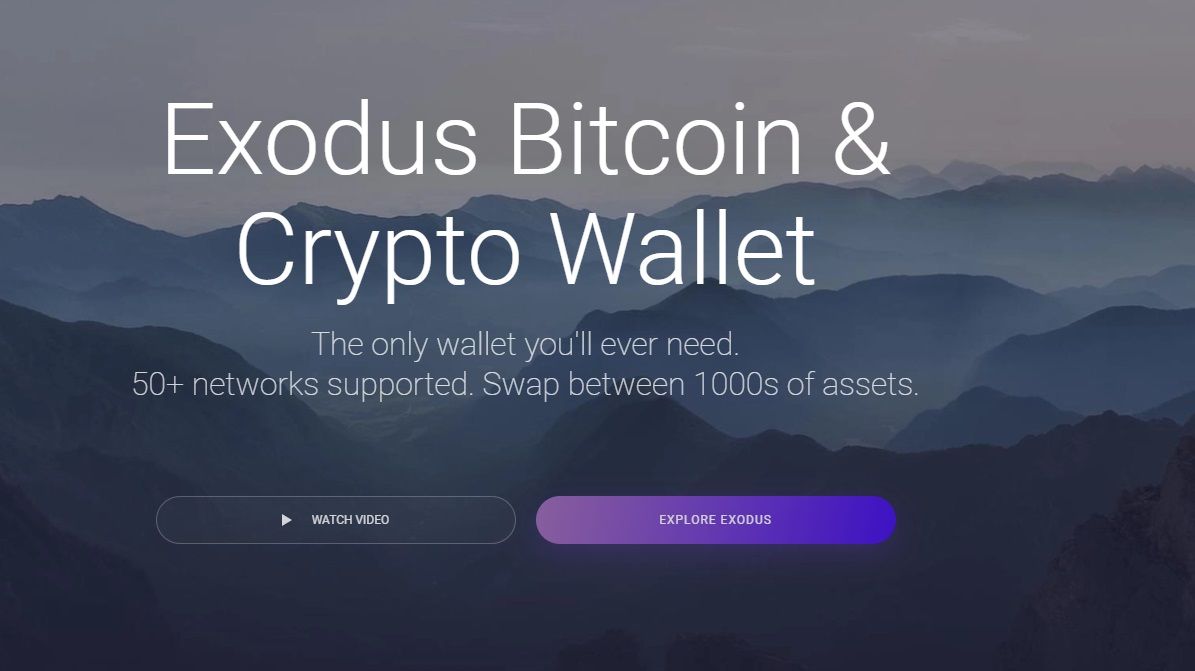 Exodus Is A Non-Custodial Cryptocurrency Wallet. Image via Exodus
Exodus Is A Non-Custodial Cryptocurrency Wallet. Image via ExodusType of Wallet
Hot wallet with hardware integration option via Trezor
Key Features
- Users can participate in staking activities directly from the Exodus Wallet, allowing them to earn rewards by contributing to the security and operation of a network that support staking.
- The wallet facilitates easy swapping of cryptocurrencies, including Ripple, enabling users to exchange assets seamlessly within the platform.
- Exodus is accessible across various interfaces, including mobile, desktop, and browser extensions, providing users with flexibility and convenience in managing their Ripple assets.
- For enhanced security, Exodus integrates with Trezor hardware wallets, allowing users to store their Ripple holdings offline for added protection against cyber threats.
Best For
Users who want an easy-to-use multi-platform wallet with DeFi tools and Trezor integration for extra security.
For a more in-depth look at Exodus Wallet's features and functionalities, you can explore our full review.
Trezor
Trezor is a highly respected name in the hardware wallet space. With options like the Safe 3, Safe 5 and Model T, Trezor brings hardware-grade security to your fingertips, along with privacy-enhancing tools like Tor and CoinJoin.
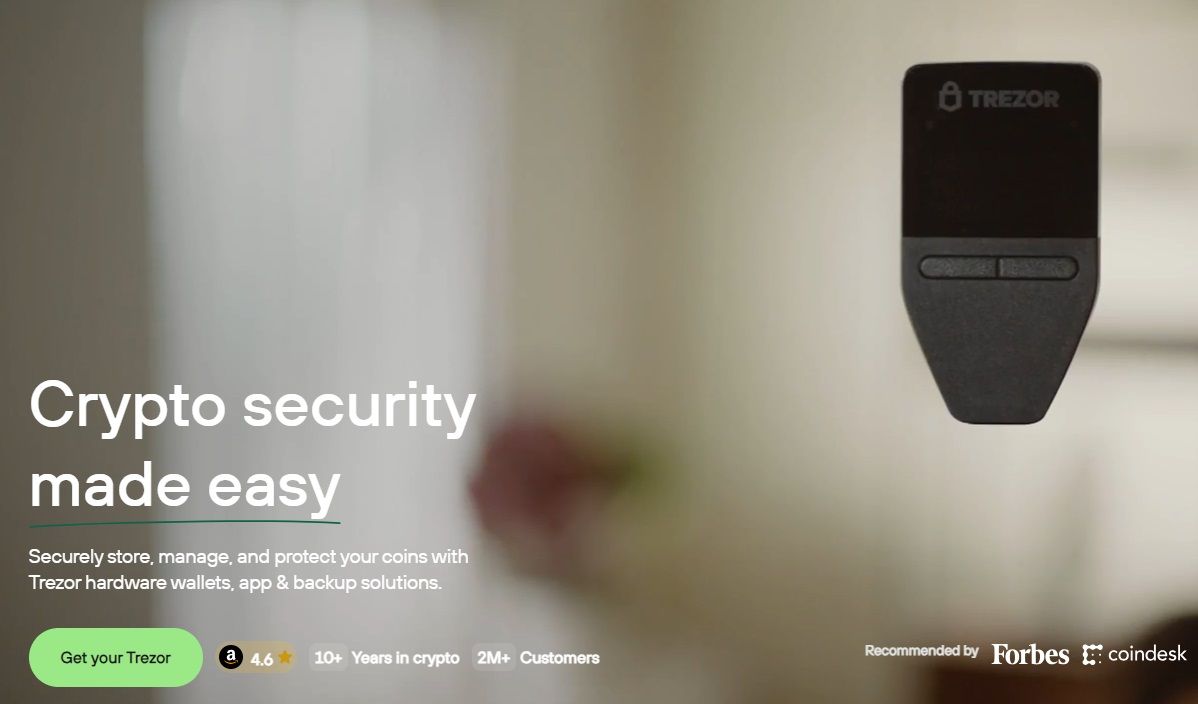 Two of Trezor's Wallets Support XRP. Image via Trezor
Two of Trezor's Wallets Support XRP. Image via TrezorType of Wallet
Hardware wallet (cold wallet)
Top Features
- Supports Ripple (XRP) and thousands of assets
- CoinJoin & Tor browser integration for privacy
- Secure Element chip with EAL6+ certification
- Offline PIN protection and recovery phrase
- Option to use with Exodus Wallet for better UX
Best For
Privacy-focused users seeking secure, offline Ripple storage with customizable privacy features.
Price
Closing Thoughts
Choosing the right Ripple (XRP) wallet is crucial for safeguarding your assets while providing convenience and accessibility. Each wallet option mentioned offers features catering to various user preferences and needs.
Hardware wallets like Ledger and Trezor provide robust security through offline storage of private keys, making them ideal for those prioritizing maximum protection against online threats. Trust Wallet and Atomic Wallet, on the other hand, offer flexibility and accessibility with their non-custodial design and support for multiple platforms.
Ultimately, the right Ripple wallet for you depends on your specific requirements regarding security and usability.





